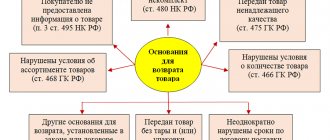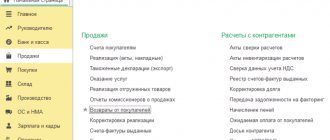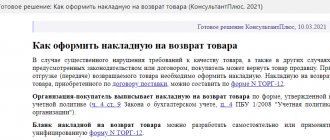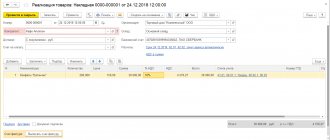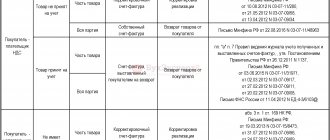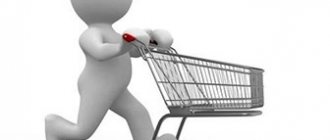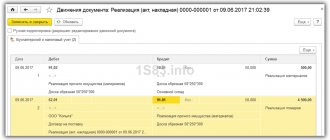Home — Articles
The Supreme Arbitration Court of the Russian Federation, in Decision No. 3943/11 dated May 19, 2011, issued a verdict on two problems that traditionally concern VAT payers. Having considered, based on the taxpayer’s complaint, clauses 1 and 4 of Letter of the Ministry of Finance of Russia dated March 7, 2007 N 03-07-15/29 “On the procedure for applying value added tax, as well as registering invoices in the purchase book and sales book when returning goods "(hereinafter referred to as the Letter), the court analyzed the legality of the requirements of the Ministry of Finance of Russia regarding the application of VAT when returning to the seller goods accepted for registration by taxpayer buyers and adjustments from the taxpayer-seller of deductions made on goods that were returned to the seller due to the expiration date (sales) and is not subsequently used by him to carry out operations recognized as objects of VAT taxation.
Look to the root
The main idea of the proposal is that the buyer, having purchased an apartment from the developer, can, if desired, return it to the seller, that is, the developer is ready to buy the property back. The question arises: why does the developer need this? Oddly enough, this program is beneficial for him, since he thus attracts funds from shareholders for construction. Even if he pays interest to the property owner during the repurchase, this amount will still be lower than the interest that he is forced to pay to the bank if he attracts loan funds for construction. In addition, getting a loan from a bank is much more difficult than getting funds from equity holders.
I can’t pay my mortgage on time – what should I do?
3 ways to sell an apartment with a mortgage
Purchase and delivery of goods from China
Delivery from China to Russia and the CIS countries is the second issue that also concerns most entrepreneurs who are just learning the basics of working with China. We will help you purchase and deliver goods from China on a turnkey basis - negotiate with sellers about delivery of the order to our warehouses in China, organize the consolidation of cargo from several suppliers, pack the cargo, carry out customs clearance and deliver to the destination city.
Buying wholesale goods from China without intermediaries is now no problem, and our commission for purchasing goods, in the amount of 3%, consists only of the bank’s commission for transferring money to China.
We have also prepared for you several ready-made solutions for purchasing goods in bulk from China without intermediaries (see Ready-made solutions). This section of our website will be constantly updated so that you can evaluate the benefits of working with China and choose the most suitable group of products for you.
Return without loss
The program did not appear by chance; it was a kind of response to the topic of the day, and the following circumstances spurred developers to this: a sharp collapse in the ruble exchange rate at the end of 2014 and an increase in the key rate. For some home buyers, buybacks also turned out to be a lifesaver: mortgage lending, which not everyone could afford before, became even more unaffordable, and the popularity of banking products in the form of deposits also fell. As a result, many citizens found themselves with free money that needed to be invested in something. Investments in real estate are considered the most reliable, but for this, the future owner should carefully select projects. Otherwise, you can easily find yourself in a situation where the purchased apartment turns out to be illiquid and it will be difficult to sell it without losing the invested funds. The developers' idea of a guaranteed repurchase of housing insures against such troubles. Even if real estate prices fall, when concluding a buyback agreement, the buyer will at least get back the amount paid for the apartment, and if the agreement provided for an increase in real estate prices, the owner may also receive interest.
Mortgage without a down payment: where, how, how much?
Mortgage refinancing
Registration and taxation of repurchase of goods
First of all, the taxpayer was concerned that the ministry was proceeding from the interpretation of the operation of returning goods as a reverse sale . As a result, it is assumed that a new purchase and sale transaction will be fully executed, where the parties change places and tax obligations for VAT arise, and the costs of repurchase of the goods cannot be written off, because it is no longer subject to sale (the product has expired). In this regard, according to the applicant, paragraph 1 of the Letter provides for taxpayers who are trade organizations encumbrances (restrictions on rights) not provided for by law: they limit the possibilities for applying the simplified taxation system; impose on retail trade organizations transferred to pay UTII the obligation to maintain separate records; are forced to reflect sales volumes of products without taking into account their returns, which leads to an unreasonable overestimation of sales volumes and creates additional obstacles to the application of government support measures; makes it difficult to conclude contracts with trading organizations and makes it impossible to attribute the corresponding acquisition costs to expenses accepted for profit tax purposes. According to the company that applied to the Supreme Arbitration Court of the Russian Federation, when the buyer returns goods (food products) with expired shelf life (sales), no sales operation occurs. In turn, the Russian Ministry of Finance objected to the recognition of clause 1 of the mentioned Letter as invalid. It is also worth noting that earlier this point had already been disputed in the Supreme Arbitration Court of the Russian Federation and Decision No. 11461/08 dated September 30, 2008 was adopted, which left it in force as corresponding to the Tax Code of the Russian Federation and the Rules for maintaining logs of received and issued invoices, books purchases and sales books when calculating value added tax, approved. Decree of the Government of the Russian Federation dated December 2, 2000 N 914. According to the disputed clause 1 of the Letter of the Ministry of Finance of Russia, the buyer, when shipping returned goods accepted for registration, is obliged in the manner established by clause 3 of Art. 168 of the Tax Code of the Russian Federation, issue the corresponding invoice to the seller of these goods and register the second copy of the invoice in the sales book. An invoice received by the seller of goods from the buyer is subject to registration in the purchase book as the right to tax deductions arises in the manner prescribed by Art. 172 of the Tax Code of the Russian Federation. In accordance with paragraph 5 of Art. 171 of the Tax Code of the Russian Federation, the amounts of VAT presented by the seller to the buyer and paid by the seller to the budget when selling goods are subject to deduction in the event of the return of these goods to the seller (including during the warranty period) or refusal of them. According to paragraph 4 of Art. 172 of the Code, deductions of such tax amounts are made in full after the corresponding adjustment transactions in connection with the return of goods or refusal of goods are reflected in the accounting records, but no later than one year from the date of return or refusal. By virtue of paragraph 1 of Art. 172 of the Tax Code of the Russian Federation, deductions of VAT amounts are made on the basis of invoices issued by sellers when the taxpayer purchases goods, after these goods have been registered. In addition, in accordance with clause 16 of the Rules for maintaining purchase books and sales books, the buyer registers invoices issued to him when returning goods accepted for registration. Thus, the buyer, when shipping returned goods accepted for registration, is obliged in the manner provided for in paragraph 3 of Art. 168 of the Tax Code of the Russian Federation, issue the corresponding invoice to the seller of these goods and register the second copy of the invoice in the sales book. An invoice received by the seller of goods from the buyer is subject to registration in the purchase book as the right to tax deductions arises in the manner prescribed by Art. 172 of the Tax Code of the Russian Federation. According to the Russian Ministry of Finance, the procedure set out in paragraph 1 of the Letter for cases of application of VAT deductions by the seller when goods are returned by buyers who have accepted them for registration could be different. However, when choosing any return mechanism, it becomes necessary to formalize this procedure with accounting documents, both by the seller, who paid VAT to the budget when selling the goods, and by the buyer, who presented the amount of this tax for deduction from the budget. The procedure for applying VAT, as well as registering invoices in the books of purchases and sales, set out in the disputed Letter, operates in accordance with the norms of the Code, the Rules for maintaining books of purchases and books of sales. In addition, the mechanism proposed in paragraph 1 of the Letter for registering the procedure for returning goods is no more burdensome than any other and makes it possible to clearly and objectively reflect in the accounting documents the actions performed by the seller and the buyer, which make it possible for the seller to claim for deduction the amounts of VAT paid on sales, and for the buyer to pay to the budget the amounts of this tax previously declared for deduction from the budget. The Supreme Arbitration Court of the Russian Federation found the arguments of the Ministry of Finance of Russia convincing and indicated that clause 1 of the Letter actually reproduces the content of the norms of the Tax Code of the Russian Federation listed therein, the Rules for maintaining purchase books and sales books, and provides explanations for the procedure for their application. The court upheld this paragraph of the Letter as consistent with current legislation. We would like to add that the taxpayer’s challenge to the fact of the buyback operation is untenable, because in this case, it clearly takes place: when the goods are shipped to the buyer, ownership of it is transferred (regardless of payment for the goods) and return as a refusal to sell is impossible. The return of goods to the seller should be considered precisely as a repurchase. Such conclusions are based on the norms of tax and civil legislation. Due to the fact that the Tax Code of the Russian Federation does not interpret the purchase and sale agreement in its own way, the institutions, concepts and terms of the Civil Code of the Russian Federation must be applied in the meaning in which they are used in this Code (Article 11 of the Tax Code of the Russian Federation). According to Art. 458 of the Civil Code of the Russian Federation, unless otherwise provided by the purchase and sale agreement, the seller’s obligation to transfer the goods to the buyer is considered fulfilled at the moment of: - delivery of the goods to the buyer or the person specified by him, if the contract provides for the seller’s obligation to deliver the goods; — placing the goods at the disposal of the buyer, if the goods must be transferred to the buyer or a person indicated by him at the location of the goods. At this moment, ownership of the goods and the risk of its accidental destruction pass to the acquirer, i.e. implementation is complete. At the same time, the Civil Code contains Art. 491 “Retention of ownership of the seller”, which provides for the possibility of deferring the transfer of ownership of the goods until payment for the goods or the occurrence of other circumstances stipulated by the contract. However, in this case, the buyer does not have the right, before the transfer of ownership rights to him, to alienate the goods or dispose of them in any other way, unless otherwise provided by law or contract or does not follow from the purpose and properties of the goods. Moreover, if within the period stipulated by the contract, the transferred goods are not paid for or other circumstances do not occur in which the ownership right passes to the buyer, the seller has the right to demand that the buyer return the goods to him, unless otherwise provided by the contract. It directly follows from these rules that the seller’s right to demand the goods back must be ensured both by a prohibition for the buyer to put the goods on sale, and by the individualization of the transferred goods (distinction from the buyer’s other goods). If this does not happen for one reason or another, it should be considered that the condition of the agreement on deferring the transfer of ownership rights is void. The Supreme Arbitration Court of the Russian Federation has indicated this for a long time - in paragraph 7 of the Information Letter of the Presidium of the Supreme Arbitration Court of the Russian Federation dated December 22, 2005 N 98 “Review of the practice of resolving cases by arbitration courts related to the application of certain provisions of Chapter 25 of the Tax Code of the Russian Federation.” Thus, the only result of qualifying an operation to return goods unsold to third parties is a buyback.
In what cases does the buyer have the right to refuse household appliances?
When the courier arrives, the buyer inspects the delivered products. It is better to do this yourself, without entrusting this operation to third parties.
Please note the circumstances under which you have the right not to accept or pay for the delivered goods:
- if during the inspection you have any complaints about the appearance of the device;
- the technical characteristics of the device described in the attached instructions or data sheet do not correspond to the description of the product on the website;
- a discrepancy in the completeness of the product was detected.
If the buyer is not a VAT payer
If the buyer of a product that goes on sale is an entrepreneur who is not a VAT payer under existing legislation, then the situation is a little different. Such cases are regulated by a special regulatory act - this is letter of the Ministry of Finance of the Russian Federation No. 03-07-15-29, 03/07/2007.
This situation is most often faced by almost all individual entrepreneurs working under the simplified taxation system (STS).
What should you do in this case? When receiving a batch of low-quality products from a supplier, the entrepreneur-seller enters the invoice data into the sales journal and takes into account input VAT. Then he can compensate for it by supplying a batch of high-quality or replaced goods from the supplier.
Despite the existing standardized formal return procedures, counterparties should initially negotiate the terms of delivery in such a way that there is no need to resort to unnecessary paperwork and waste precious time on this.
Video about VAT: New format for returning goods
Noticed a mistake? Select it and press Ctrl+Enter to let us know.
Share
Class
Telegram
Basic Concepts
When purchasing a product for further sale (wholesale), the seller is called the supplier, and the buyer is called the counterparty. The role of the supplier can be directly from the manufacturer (manufacturer) of the product, a legal organization or an individual. In relation to the buyer, the supplier is obliged to:
- provide a certain number of purchased products of appropriate quality;
- fully satisfy legal claims regarding the acquisition from the counterparty;
- make deliveries within the terms specified in the contract, without delays.
The counterparty is obliged to accept the supplied objects and pay for everything provided to him in the manner specified in the contract: advance (preliminary) payment, upon receipt, upon sale (according to schedule).
If payment terms are violated, the seller has the right to file a payment claim against the consumer.
How to reflect the return of goods in tax accounting for income tax ?
If the supplier fails to comply with the terms of the agreement, the buyer has the right to return the goods in whole or in part. Problems with return transfer often arise due to a lack of completeness of the delivery or non-compliance with quality parameters. The supplier and counterparty document the transaction by making the necessary accounting entries.
By the way! By agreement, it is possible to replace the purchase or eliminate violations within a specified time frame. If the seller evades fulfillment of claims, the counterparty has the right to send a statement of claim to the judicial authorities.
Postings when returning goods to the supplier
The reasons for returning products can be completely different. Let's look at how to reflect it in wiring in different situations.
The buyer did not accept the defective products for registration
| Operation | Debit | Credit |
| Products with defects are written off off-balance sheet | 002 | |
| Money returned | 51 - for current accounts; 52 - for foreign currency accounts, etc. | 60 - settlements with suppliers or contractors |
The seller's account is displayed:
| Operation | Debit | Credit |
| Decrease in revenue from the sale of low-quality goods (STORNO) | 62 - settlements with buyers and customers | 90 - sales |
| Reducing the cost of shipped low-quality goods (STORNO) | 90, subaccount “cost of sales” | 41 - product |
| Reduction of VAT charged on low-quality products | 90, subaccount - VAT | 68 - calculation of taxes and fees |
| The buyer was refunded | 62 | 51,52, etc. |
The buyer accepted the defective goods for registration
| Operation | Debit | Credit |
| Product written off after return | 60 | 41 |
| VAT accrual after return | 60 | 68 |
| Refund received | 51, 52, etc. | 60 |
Return of quality goods
Buyer:
| Operation | Debit | Credit |
| Revenue from returns reflected | 60 | 90, subaccount - revenue |
| Write-off of the cost of returned products | 90, subaccount - cost of sales | 41 - product |
| VAT accrual on price | 90, subaccount - VAT | 68 |
| The buyer received funds | 51, 52 | 60 |
Salesman:
| Operation | Debit | Credit |
| The returned item has been received | 41 | 62 |
| VAT included | 19 | 62 |
| Money returned | 62 | 51, 52 |

